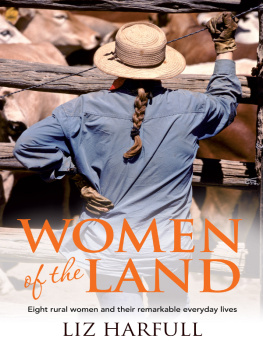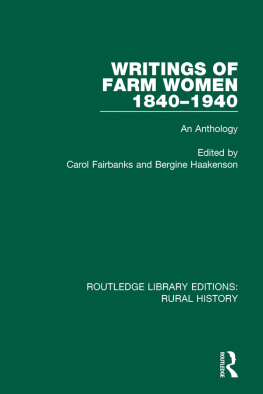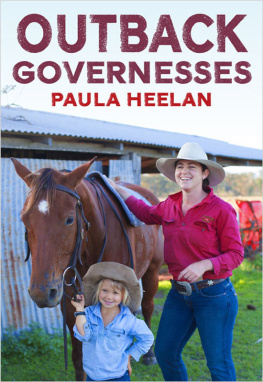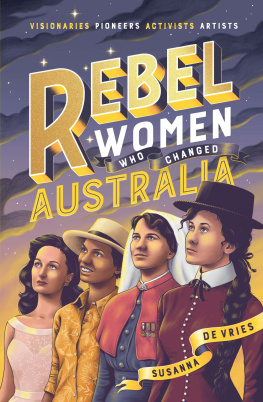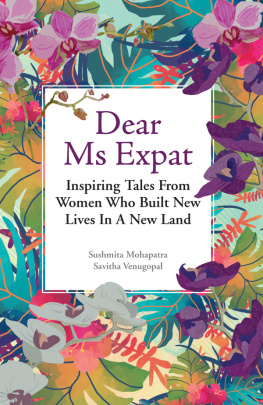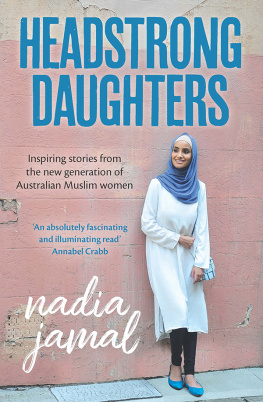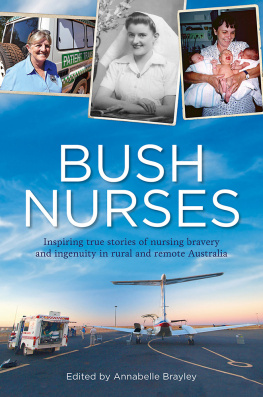Liz Harfull is an award-winning journalist and Churchill Fellow. She grew up on a small farm near Mount Gambier which has been in the family since the early 1860s.
She worked for several newspapers before spending twelve years with a leading national public relations business specialising in agriculture and environmental management. In 2006 she walked away from being a co-owner/director of the business to focus on her writing. She is passionate about telling the stories of regional Australia and in 2008 Liz published her first book, the bestselling Blue Ribbon Cookbook.
Today Liz lives in the Adelaide Hills, juggling a busy writing career with her voluntary work as president of a national council representing rural journalists and communicators.
WOMEN
of the LAND
LIZ HARFULL

Eight rural women and their remarkable everyday lives

Unless otherwise marked, all photographs are by the author.
Photograph on provided by Catherine Bird
First published in 2012
Copyright Liz Harfull 2012
All rights reserved. No part of this book may be reproduced or transmitted in any form or by any means, electronic or mechanical, including photocopying, recording or by any information storage and retrieval system, without prior permission in writing from the publisher. The Australian Copyright Act 1968 (the Act) allows a maximum of one chapter or 10 per cent of this book, whichever is the greater, to be photocopied by any educational institution for its educational purposes provided that the educational institution (or body that administers it) has given a remuneration notice to Copyright Agency Limited (CAL) under the Act.
Allen & Unwin
Sydney, Melbourne, Auckland, London
83 Alexander Street
Crows Nest NSW 2065
Australia
| Phone: | (61 2) 8425 0100 |
| Fax: | (61 2) 9906 2218 |
| Email: | info@allenandunwin.com |
| Web: | www.allenandunwin.com |
Cataloguing-in-Publication details are available
from the National Library of Australia
www.trove.nla.gov.au
ISBN 978 1 74237 753 7
Internal design by Darian Causby
Map by Mapgraphics, Brisbane
Set in 12/16 pt Sabon Pro by Bookhouse, Sydney
Printed and bound in Australia by Griffin Press
10 9 8 7 6 5 4 3 2 1

CONTENTS
Mary Naisbitt, Tarin Rock, Western Australia
Lynette Rideout, Oakdale, New South Wales
Jan Raleigh, Timboon, Victoria
Nan Bray, Oatlands, Tasmania
Susie Chisholm, Adelong, New South Wales
Cecily Cornish, Wando Bridge, Victoria
Catherine Bird, Willalooka, South Australia
Keelen Mailman, Augathella, Queensland
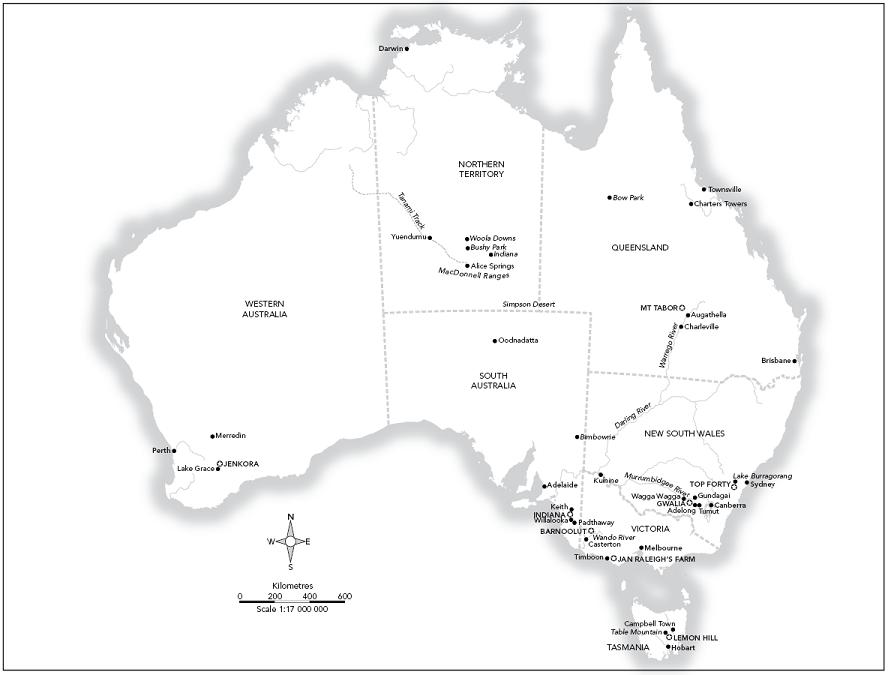
I n setting out to write this book, I was told very early on by quite a few people that I would struggle to find women who had willingly taken on the challenge of managing an Australian farm. No woman would be foolish enough to attempt it on their own unless they were forced by circumstance, and I would certainly have a hard time finding women running farms on a commercial, full-time scale if there were able-bodied men in their lives who could take over for them or, at least, share the endeavour equally. What surprised me most is that the people saying this were other rural women.
Having spent most of my working life to date telling the stories of regional Australia in one form or another, I knew it simply wasnt true. In fact, after just a few weeks of very basic research, I had a list of more than 40 potential candidates and I had barely scratched the surface. The greatest challenge was not finding women to write about, but choosing which stories to tell.
In deciding who to write about, I was influenced by my own background as the daughter of dairy farmers from a small farm in a closely settled area of South Australia. Writers, artists and filmmakers have long been fascinated with the outback and the more remote parts of our wide brown land, but there is much more to the Australia that sprawls beyond our urban boundaries. I wanted to share the experiences of women living in some of these places too, as well as their families and communities, and to capture something of their daily lives, personal struggles and extraordinary achievements.
While tragedy and unhappy circumstances may have played a role in some of them becoming farmers in their own right, it is by no means the only reason they are doing what they do. All these women share two things in commonthey have made active choices to be farmers, and they love the land. Some are single, some are not, some have children and some do not. Some come from generations of farmers and grew up on the land. Some were actively discouraged by their parents from considering becoming farmers despite the fact it has been their hearts desires since they were children, not because they were girls but because it can be a tough and unforgiving way for anyone to make a living.
Spending time with these women emphasised the physical challenges that all farmers face. Farms can be dangerous work environments given they usually involve operating machinery and handling livestock, and some of them have experienced life-threatening injuries. While the nature of the work is physical there is more than one way to get the job done, as these women also demonstrate. Because they cannot rely on brute strength, they have found alternative approaches and clever little tricks that enable them to tackle many tasks on their own, whether it be handling a recalcitrant bull, hoisting a sheep onto the back of a ute, or working out the best way to move a stack of fence posts or a 30-kilogram bag of stock lick.
As someone who has observed more than a few farmers at work, I was also struck by their approach to working with others. Before they leapt into the task, they talked about it first to anyone helping out so that everyone was clear on what needed to be done and what was expected of each individual. Believe me this is far from common, as the number of seminar sessions run for farmers on communication skills and managing employees tends to testify. And it struck me that all of them are great networkers, quick to identify people who can provide advice and support when needed, and never ashamed to ask for it or accept it.
One of the more startling aspects of researching these stories was the unexpected points of connection between what at first glance seemed to be a group of women from totally different parts of the country and totally different backgrounds. It is hard to explain the series of coincidences and strange serendipity that kept emerging.
It began with discovering that Cecily Cornishs ancestors made their start as pastoralists in Australia when they bought a block of land from the pioneering John Hawdon, brother of famous overlander Joseph Hawdon, who drove the first mobs of cattle from New South Wales to Victoria and South Australia. John turned out to be Susie Chisholms great-great-grandfather.
It ended on my final research trip with Keelen Mailman pointing out a distant hill on the station she manages in western Queensland. The hill was given its English name by the colonial explorer Major Mitchell, who climbed it during one of his famous expeditions from Sydney into the unknown hinterland. Only weeks before another farmer thousands of kilometres away in Victoria had taken me to a favourite spot on her farm, pointing out that it was the place where Major Mitchell stood to survey the valley before him on a completely different expedition.
Next page
